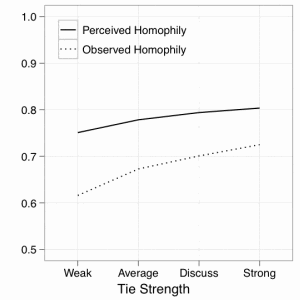What Your Friends Don’t Know About You
How well do you know your friends’ political views? According to recent work by Winter Mason, Duncan Watts, and myself, you probably don’t know them as well as you think. In particular, we found that when friends disagree on a political issue, they are unaware of that disagreement about 60% of the time. Even close friends who discuss politics are typically unaware of their differences in opinions.
Homophily, the tendency for individuals to associate with similar others, is one of the more consistently observed phenomena of the social world. While reports of homophily have focused on socio-demographic attributes—like age, gender, and race—it’s reasonable that homophily would extend to attitudes as well, in part because individuals likely seek out those who agree with them, and in part because social pressure often breeds conformity. However, measuring the extent to which friends agree with one another is a tough empirical problem, and quantifying the differences between actual and perceived homophily was, until recently, prohibitively difficult.
Enter Facebook, the social science experimentation platform with a subject pool of 400 million strong (and growing). To examine the differences between real and perceived attitude agreement, we built a Facebook game where players both answered a series of questions about their own attitudes, and attempted to guess how particular friends would respond. We collected 12,000+ responses in which we had a player’s answer to a given question, their friend’s answer to that same question, and the player’s guess as to what their friend would say.
The figure below shows that people consistently overestimate the likelihood that their friends agree with them on political issues. Notably, even though close friends (so-called strong ties[1]) are in reality more likely to agree with one another than distant friends, people do not appropriately adjust their perceptions. In other words, though we think close and distant friends are about equally likely to agree with us on political issues, in reality we are much more likely to agree with close friends.
Upon reflection, it’s perhaps not so surprising that we often don’t know where our friends stand on hot-button political issues. How many times have you actually asked your friends how they feel about abortion, capital punishment, or affirmative action? Inferring friends’ attitudes is further complicated by the fact that political positions tend to be only weakly correlated across issues. For example, according to the 2008 General Social Survey, 65% of people who support abortion rights also support capital punishment, compared to 68% among those who oppose abortions. That is, someone’s position on abortion tells you nearly nothing about their view on capital punishment.
I think society would benefit from friends and neighbors engaging in more active political deliberation, discussions that at the very least leave participants aware of each other’s views. On the other hand, if your friends really knew what you thought, you might have a lot fewer friends.
N.B. For more details, check out our paper.
Illustration by Kelly Savage
Footnotes
[1] We define the tie strength between a pair of individuals by considering the number of mutual friends that they have, and whether or not the pair discusses politics.


